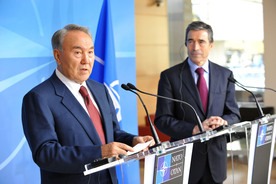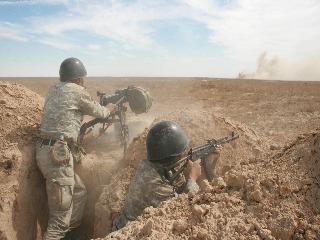“CACI Analyst, September 18, 2013”
Kazakhstan Steppe Eagle Exercise Helps Sustain NATO Ties
By Richard Weitz (the 18/09/2013 issue of the CACI Analyst)
The latest Steppe Eagle annual multilateral military exercise in Kazakhstan occurred from August 10-23, at the Illisky Training Center near Almaty. The exercise, held under NATO auspices, confirms that the Kazakhstani national security community wants to retain defense ties with Western countries despite their country’s deep military relations with Russia. This goal should grow in coming years as NATO winds down its combat operations in Afghanistan. In this context, sustaining Kazakhstan’s Airmobile Forces Brigade (KAZBRIG) is important for promoting interoperability between NATO and the rest of Kazakhstan’s military.

“CACI Analyst, September 4, 2013”
Kazakhstan Plans to Rewrite Its Innovation Strategy by Hosting EXPO-2017: Will It Work?
By Rafis Abazov and Arystanbek Mukhamediuly (the 04/09/2013 issue of the CACI Analyst)
Kazakhstan plans to host World EXPO under the theme “Energy of the Future” in 2017 as part of its ambitious Innovation Strategy, designed to develop skill-intensive sectors and to promote innovative businesses, especially in the alternative energy sector. In preparation for the event, the Kazakh government plans to spend between US$ 3 and 5 billion on alternative energy development and infrastructure, respectively. Opinions in the country are deeply divided. Some believe that this is an excellent opportunity to promote targeted industries and small and medium enterprises (SMEs) in the alternative energy sector. Others are very skeptical, considering it likely to become another white elephant with little impact on Kazakhstan’s national economy.

Kazakhstan's Counter-Terrorism Strategies for The Post-2013 Security Environment
By Jacob Zenn (the 04/09/2013 issue of the CACI Analyst)
Since the first terrorist attacks struck Kazakhstan in 2011, the country has reformed its counter-terrorism strategy to confront emerging threats. Kazakhstan learned that more intelligence and understanding of extremists could have prevented the attacks. The country also saw that counter-radicalization programs are necessary to counter Salafism, which is anathema to the country’s religious traditions and can serve as a gateway to jihadism. In the near future, Kazakhstan will also focus on regional counter-terrorism cooperation to limit the fallout of wars abroad on the home front.



